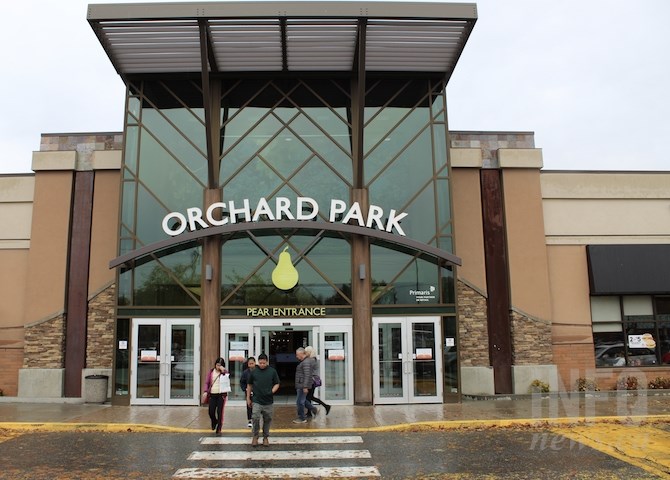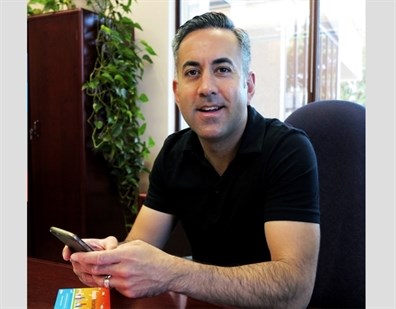
Retail sales is one of the biggest employment categories in the Central Okanagan. The region has the second lowest unemployment rate in the country and is drawing newcomers from across the country.
(ROB MUNRO / iNFOnews.ca)
January 27, 2021 - 7:00 AM
Max Carbone not only helps newcomers get settled into Kelowna but he’s also a perfect example of why they’re flocking to the Central Okanagan.
He and his wife, Anna, moved to Kelowna four years ago from Eastern Canada and bought Century 21 Assurance Realty.
“I was fortunate to travel across Canada,” he told iNFOnews.ca. “I had a little grid on where is the best place in the country to live and my wife and I said, all things taken into consideration, Kelowna was number one on the list. There’s not that many spots that are this attractive across Canada.”

Max Carbone, owner of Century 21 Assurance Realty
Image Credit: Submitted/Century 21 Assurance Realty
Now he’s helping others, many from the Prairies and Ontario, who want to do the same thing for many of the same reasons.
The influx of new people is one of the reasons the Kelowna Census Metropolitan area (otherwise known as the Central Okanagan) has the second lowest unemployment rate in Canada at 4.5 per cent, just a bit behind Quebec City (4.3 per cent).
READ MORE: Kelowna jobless rate falls while rest of the region sees increase
This comes despite the fact that COVID-19 has hammered the tourism industry that has long been a huge part of the region’s economy.
A 2018 economic profile of the region by the Central Okanagan Economic Development Commission had accommodation and food services generating 9.4 per cent of the jobs in the region back then.
But its downturn because of the COVID-19 pandemic, while devastating for those working in those fields, has had minimal impact on the Central Okanagan’s economy as a whole.
That’s because we are now so much more than tourism and agriculture, Mayor Colin Basran told iNFonews.ca.

Kelowna Mayor Colin Basran
Image Credit: Submitted/City of Kelowna
“We are aviation,” he said. “We are medical. We are manufacturing. We are tech. We are animation. We are so many cool things that even 10 years ago a lot of people would never have envisioned.”
There’s a good reason for all that interest.
“It’s quality of life,” Basran said. “It’s the quality of the infrastructure here. It’s the opportunities. We’re a very entrepreneurial city. It’s the public amenities and facilities like hospitals, like universities, like schools. It’s a number of different things and what we’re trying to create here, at the city, is an environment where people want to be here and invest. And I’m really proud of the work that is being done and we’re seeing the fruits of that labour.”
And he made no bones about the role city staff and council have played in transforming the city and, by extension, the entire Central Okanagan.
“We provide the environment for people to invest and help create the high quality of life so I actually do believe we play a big role in it,” Basran said, while acknowledging “we certainly haven’t done it alone.
“I’m really proud of the work that we’ve done to create the environment for people to want to live here and invest here. That doesn’t happen by accident. Council could have destroyed that through various decisions we’ve made but I’m really proud of the fact that we’ve enhanced that opportunity.”
That’s why realtors like Carbone are helping people buy homes and businesses in the Central Okanagan.
Four or five years ago, 25 per cent of real estate deals involved people from outside the Central Okanagan, with 15 per cent coming from the Lower Mainland, he said.
While 15 per cent of the deals still involve Lower Mainland buyers, 38 per cent are now from outside the region, Carbone said. The change is that more are coming from Eastern Canada. They range from people in their 20s moving from Alberta seeking better economic opportunities all the way to the traditional well-heeled seniors.
There are many other possible destinations in the Interior of B.C. but, to his mind, the Central Okanagan is special.
“You’ve got a good economic climate,” Carbone said. “You’ve got a very entrepreneurial environment and culture. Obviously, we’ve got the geographic benefits – the lake, outdoor activities like skiing and golfing. For a lot of people coming from urban centres, there’s enough of a critical mass here in Kelowna in terms of the restaurants, wineries, just a lot of really nice amenities that some of the other areas might not have. I think a lot of people feel this is the hub for the Interior, given the university, the college, the medical and other activities.”
From 2011 to 2019 the Central Okanagan’s population grew by almost 34,000 people. That’s the equivalent of dropping all of West Kelowna into the region over an eight year period.
That’s an 18.3 per cent increase in population, compared to a provincial rate of 12.6 per cent.
Elsewhere in the Southern Interior, the Thompson-Nicola regional district grew by 11.6 per cent during those eight years, the North Okanagan by 10.2 per cent and the Okanagan Similkameen by nine per cent.
Many are coming with big bucks to spend.
Despite the initially devastating impact of COVID-19 on the real estate market, it has now taken off, driving the average price of a home in B.C. up by 12.5 per cent. In the Central Okanagan, average prices have jumped by 37.2 per cent, Carbone said.
“Part of that skew is there are a lot more homes over $1 million that were purchased,” he said. “People are coming in from other parts of the country who have resources. A lot of them are buying the million-dollar-plus homes. It was a pretty significant jump in the higher end homes.”
As for the struggling tourism sector, that may be about to change.
“Once the vaccine rolls out and people are more comfortable in social environments, I just have this feeling that the hospitality businesses in the Kelowna area, assuming that they can hang on, they’re well set up to have some really phenomenal experiences,” said Karen Christiansen, an accountant who has lived in Kelowna for 30 years and written articles for the Chartered Professional Accountants of B.C. on the region’s economy.

Accountant Karen Christiansen.
Image Credit: Submitted/mnp.ca
“Other people are catching on to the lifestyle without the big urban push,” she said. “There’s not the risk of living in a giant urban area, not the hassle of living in a giant urban area. If you live in Vancouver or Toronto it’s really hard to commute, for example, without being on a really busy public transit system.”
She points to the apparently never-ending housing projects in the region, from hundreds of single-family lots coming on stream in West Kelowna to downtown Kelowna high-rises.
“That has to mean the people who are putting their hard earned capital into these projects have a very positive feeling on the continued growth of the whole Okanagan Valley,” she said.
The City of Kelowna alone is expected to grow by 50,000 people by 2040, needing almost 21,000 new housing units.
Things like a new Rogers call centre, that is projected to grow to 500 employees, easily offsets the roughly 200 jobs lost when the Tolko mill closed last year.
“UBCO is an amazing shining light that brings really smart and thinking people into our community,” Christiansen said. “When you look at UBCO talking about a downtown facility, even the capital that they put into such projects is going to have a huge impact. People want to be here. It’s the lifestyle. I don’t know how many times I’ve heard us referred to as the 'Napa of the North.' I think a lot of people are attracted by the beauty of the wineries and what that means esthetically to be in our backyard.”
Which is one reason her association’s studies show agriculture is still a growing sector of the local economy.
“Don’t forget, viticulture is included in that agriculture industry so, when you look at the explosion of wineries – that’s a real cross section between tourism and agriculture.”
While there may be jobs in wineries and brew pubs, Statistics Canada does not provide numbers on how many people actually grow crops in the Central Okanagan. That employment category is marked in their data tables with an x in all but one year since 2011. That means there are fewer than 1,500 people employed in the sector so the numbers are “suppressed to meet the confidentiality requirements of the Statistics Act,” a footnote on the data table says.
The only year a jobs number was registered for agriculture was in 2013 when there were 1,800 people employed in the sector.
It’s a different statistical story with “Accommodation and food services.” That sector has grown from 3,600 jobs in 2001 to 8,400 in 2019 before falling to 5,900 during 2020’s COVID-19 pandemic.
The Central Okanagan’s overall labour force grew from 92,900 in 2011 to 105,300 in 2019. It dropped by 4,500 in 2020.
The biggest single employer was the wholesale and retail trade category with 17,500 jobs in 2019, followed by Health care and social assistance with 16,300 jobs.
Being from Eastern Canada, Carbone pointed out one other key factor that makes the Central Okanagan so attractive to newcomers.
“In general, you find people here friendly, open, inviting,” he said. “It’s a nice entrepreneurial community. A good political environment that’s supportive of both economic, development and socially responsible activities. It’s just kind of a nice balance of doing the right thing for people and the planet and building business and living in a, quite frankly, spectacular environment.”
To contact a reporter for this story, email Rob Munro or call 250-808-0143 or email the editor. You can also submit photos, videos or news tips to the newsroom and be entered to win a monthly prize draw.
We welcome your comments and opinions on our stories but play nice. We won't censor or delete comments unless they contain off-topic statements or links, unnecessary vulgarity, false facts, spam or obviously fake profiles. If you have any concerns about what you see in comments, email the editor in the link above.
News from © iNFOnews, 2021